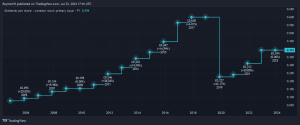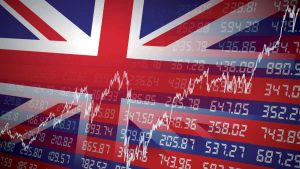Share this page:
The prospect of a recession is looming heavy on the horizon. But if this does happen, it’s not necessarily a reason to panic. There are ways you can prepare your investment portfolio to ride out any troubles.
In this article, I’ll explain exactly what a recession is and how it links to periods of high inflation. I’ll also cover the ways the stock market tends to perform in these economic climates, and how you can plan your portfolio.
How a recession is defined
The word ‘recession’ is a pretty scary term. It’s usually somewhat of a boogeyman phrase in the financial world, and it can lead to significant worry.
However, recessions are not always as bad as they sound. The definition of the term is a fall in GDP (gross domestic product) for two consecutive quarters. Now, that doesn’t seem quite so frightening, does it?
Sure, this isn’t an ideal economic environment, and slowing growth can have implications. This is most commonly felt in employment – usually in the form of less-competitive wages and fewer jobs available.
Generally speaking, they are periods where there is a lack of confidence in the economy. Such periods are not ideal, but there’s no need for nightmares.
The link between inflation and a recession
When it comes to the economy and the markets, what happens in America often reverberates around the rest of the world. So, I’m going to explain some key historical data relating to the US, high inflation and recessions.
Data shows that in the last 70 years, anytime there’s been an inflation reading in the US of over 5%, a recession has usually followed.
With inflation levels at over 7% in the US right now, the prospect of a recession is looking quite likely. Obviously, historical data doesn’t tell us exactly what will happen in the future, but it can be a good indicator.
How the stock market performs during a recession
What you may be surprised to hear is that a recession and poor GDP growth results do not necessarily mean stocks and shares will underperform.
Sometimes, stock markets don’t reflect what’s going on with the economy in real-time. You probably noticed this during the coronavirus pandemic. Most of the global economy was shut down, and yet plenty of investments actually flourished. Go figure!
Since 1869, there’s been a total of 30 recessions in the US. And, of those 30, a total of 16 saw positive stock market returns from the beginning of the recession to its end.
In those 16 that had positive returns, the return rate ranged from 0.7% to 38.1%, with an average return of 9.8%!
Steps you can take to prepare
So, as you can see from this data, buying shares during a recession can actually lead to positive returns.
It’s worth pointing out there were still recessions that led to negative returns. But, with odds of around 50/50, for most investors, it’s not worth rolling the dice and attempting to cash out of the market.
You’d need the skills of a magician to predict your exact exit and entry points to have any chance of beating a simple buy and hold strategy. This means that your best chance of succeeding long term, even during a recession, is to build a diversified portfolio and stick with it.
Trying to jump in and out of markets can seriously dampen your returns. Even if you knew with 100% certainty that a recession was incoming, there are no guarantees with the markets. You may still get out less than you put in.
So, it seems best to invest sensibly and always try and keep a long-term mindset.
Was this article helpful?
YesNo
About the author
George is a freelance writer focused on educating others in personal finance, tax, and investing. He’s a qualified Financial Adviser and previously worked within property and insurance in a number of different countries…. Read More
Share this page:
Some offers on The Motley Fool UK site are from our partners — it’s how we make money and keep this site going. But does that impact our ratings? Nope. Our commitment is to you. If a product isn’t any good, our rating will reflect that, or we won’t list it at all. Also, while we aim to feature the best products available, we do not review every product on the market. Learn more here. The statements above are The Motley Fool’s alone and have not been provided or endorsed by bank advertisers. John Mackey, CEO of Whole Foods Market, an Amazon subsidiary, is a member of The Motley Fool’s board of directors. The Motley Fool UK has recommended Barclays, Hargreaves Lansdown, HSBC Holdings, Lloyds Banking Group, Mastercard, and Tesco.
This post was originally published on Motley Fool







